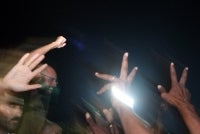Extraordinary children: 'We are the ones who need them, not the other way round' - Faizal Tahir

SHAH ALAM - The presence of disabled children is a blessing to the parents, not the other way round, says singer-composer Faizal Tahir in an emotional sharing about his four-year-old Down syndrome daughter Maryam Tahirah.
"When the doctor broke the news to me about the condition of my child, he told me to make sure that I spend enough time with her because she would be needing me the most.
"We are the ones who need them, not them. Allah SWT always gives what is best for us," he said before he broke into tears.
He said this during a talk entitled "Anak Syurga Luar Biasa" during the Ziarah Ramadan programme organised by the Federal Territories Islamic Religious Council Zakat Collection Centre (PPZ-MAIWP) in collaboration with Sinar Harian and Malaysian Advocates for Cerebral Palsy (MyCP) at the Karangkraf Group Complex here on Thursday.
During the talk, Faizal who was panellist also focused on the Islamic perspective and said that it was important to put Allah and the Quran first as guidance in coping with the experience of raising disabled children.
"We would need continuous support from others to be able to do what we do, and let’s not forget about our religion while doing so too," he said.
Meanwhile, Bikeisable Club president Wira Sudepja Rabu whose daughter suffered from cerebral palsy and is wheelchair-bound pointed out three challenges of raising children with special needs, such as physical, emotional and financial.
"Autistic kids, for example, would be going through tantrums and hitting people without any intention, which is what we call a physical barrier, but that is what parents need to understand and know how to cope with," he said.
He added that it was important that parents understand how having disabled children would affect others and know how to handle it.
"Besides the parents, this would also affect the other siblings in the family or those who live with disabled children.
"People who are already financially stable are advantaged when it comes to caring for these children and those who do not have enough money would not be able to send them to the support centres for their education among others," he said.
Download Sinar Daily application.Click Here!















